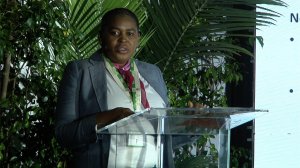While the forestry sector has achieved notable progress in transformation over the past 15 years, more needs to be done to ensure the sector is sustainable and creates long-term value for stakeholders and communities.
This was the key message from speakers at the Forestry Sector Charter Council’s (FSCC’s) fifteenth anniversary event, held in Johannesburg, on October 9.
The FSCC is responsible for monitoring and reporting on the sector’s progress in achieving broad-based black economic empowerment (BBBEE) targets.
FSCC chairperson Nelly Ndlovu highlighted that while the industry had progressed transformation, as enshrined in the Forest Sector Charter, there was room for improvement, with several areas still lacking.
She highlighted that progress had been made in supporting individuals and communities to develop socioeconomic programmes and enterprises needed to create employment and economic growth.
Moreover, Ndlovu said that there had been considerable investment in skills development and bursary programmes for previously disadvantaged persons.
She also highlighted continuous growth in enterprise and supplier development efforts.
Ndlovu further stressed that there were opportunities to make further progress on these strides, to enable the sector to be a lever for economic growth and engender much-needed benefits for rural communities.
She pointed out that the desired strides had not been made in management control, especially in terms of women representation in managerial and executive structures.
Ndlovu said that, notably, the forestry sector achieved Level 3 BBBEE status in the 2022/23 reporting period, and she was hopeful work would continue to enable it to soon reach Level 2.
Ndlovu emphasised that transformation was a journey, not a destination, and averred that collaboration was key to achieving lasting change, with input required from government, the public sector, the private sector and individuals.
Delivering a keynote address at the event, Forestry, Fisheries and the Environment Deputy Minister Bernice Swart cited the FSCC’s 2022/23 ‘State of Transformation’ report, which indicated that out of the 35 reporting medium-szied and large enterprises, 17 achieved a Level 1 BBBEE score, four achieved Level 2, six achieved Level 3, and two achieved Level 4, while the remaining six achieved lower than Level 4.
Also, the majority of the 56 qualifying small enterprises reported that they were majority black-owned.
She reiterated the call for collaboration to build on this.
While providing a deep dive into the forestry sector’s transformation milestones over the past 15 years (see video for more on these milestones), FSCC executive director Khosi Mavimbela reiterated the call for collaboration and closer linkages to improve transformation reporting moving forward.
This would entail subsector associations developing collaborative partnerships, initiatives and strategies to increase reporting among their members.
There would also be work with CEOs to foster an internal expectation to report.
Moreover, an online reporting system would be implemented to reduce input errors and to simplify the process, she explained.
Mavimbela also stressed the need for the FSCC to do more work in creating awareness and to promote and praise consistent reporting and improvement.
Reiterating the ethos that transformation was a journey, she said this required self-checks to ensure consistent positive progress.
Moreover, there should be promotion of efforts of those continuously reporting, through sharing their transformation story, she averred.
Edited by: Chanel de Bruyn
Creamer Media Senior Deputy Editor Online
EMAIL THIS ARTICLE SAVE THIS ARTICLE
ARTICLE ENQUIRY
To subscribe email subscriptions@creamermedia.co.za or click here
To advertise email advertising@creamermedia.co.za or click here












